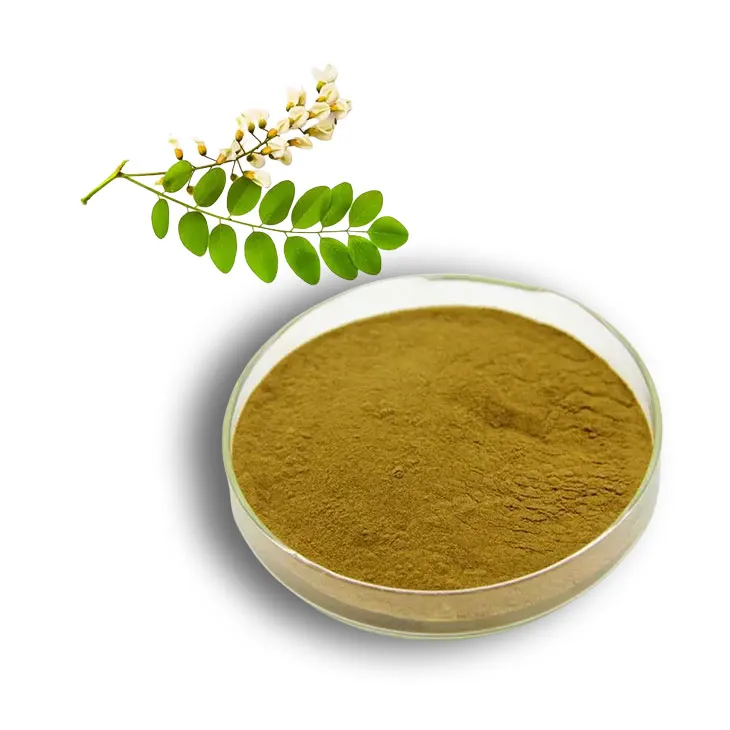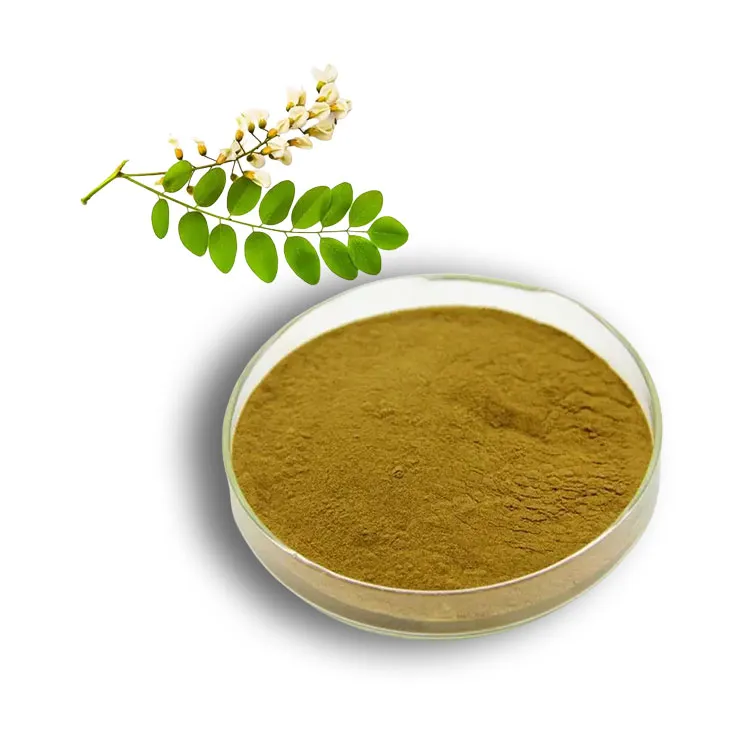- 0086-571-85302990
- sales@greenskybio.com
Sophora japonica Flower Extract: Vitality, Strengthening and Balance
2024-12-22

Introduction
In recent years, the Hawthorn Extract has emerged as a highly sought - after natural remedy, primarily due to its profound impact on vitality, strengthening, and balance within the human body. This extract, derived from the hawthorn plant, has a long history of use in various traditional medicine systems around the world.

Chemical Composition of Hawthorn Extract
The effectiveness of Hawthorn Extract can be attributed to its rich chemical composition.
Flavonoids
Flavonoids are a major component of hawthorn extract. They possess antioxidant properties that help in protecting the body's cells from damage caused by free radicals. For example, Quercetin and rutin are two important flavonoids present in hawthorn. These compounds can enhance the immune system, which is crucial for overall vitality. They work by neutralizing harmful substances in the body and reducing oxidative stress.
Proanthocyanidins
Another significant group of compounds in hawthorn extract is proanthocyanidins. These are known for their ability to improve the health of blood vessels. They can strengthen the walls of blood vessels, making them more elastic. This, in turn, helps in better blood circulation throughout the body. By improving blood circulation, proanthocyanidins contribute to the strengthening of various organs as they receive an adequate supply of oxygen and nutrients.
Organic Acids
Hawthorn extract also contains organic acids such as citric acid and malic acid. These acids play a role in maintaining the body's acid - base balance. They are involved in various metabolic processes in the body. For instance, citric acid is an important part of the Krebs cycle, which is essential for energy production. Maintaining a proper acid - base balance is vital for the overall balance of the body's physiological functions.

Hawthorn Extract in Traditional Medicine
Hawthorn has a long - standing reputation in traditional medicine.
Ancient Chinese Medicine
In Ancient Chinese Medicine, hawthorn has been used for centuries. It was often prescribed for digestive problems. The Chinese believed that hawthorn could help in improving digestion by promoting the secretion of digestive enzymes. It was also used to treat heart - related ailments. For example, it was thought to strengthen the heart and improve blood circulation in the cardiovascular system.
European Herbal Medicine
In European herbal medicine, hawthorn has been used as a remedy for heart conditions. It was used to relieve symptoms such as chest pain and shortness of breath. Herbalists in Europe believed that hawthorn had a tonic effect on the heart, making it stronger and more efficient. Additionally, it was used to treat nervous disorders. Hawthorn was thought to have a calming effect on the nervous system, helping to relieve stress and anxiety.

Role in Modern Healthcare
The potential of hawthorn extract in modern healthcare is vast.
Cardiovascular Health
One of the most important areas where hawthorn extract shows great promise is in cardiovascular health. As mentioned earlier, proanthocyanidins in the extract can strengthen blood vessels. This can help in reducing the risk of developing atherosclerosis, a condition where the arteries become clogged with plaque. Hawthorn extract can also lower blood pressure. It does this by relaxing the smooth muscles in the blood vessels, allowing for easier blood flow. Moreover, it can improve the heart's pumping ability. Studies have shown that patients with mild heart failure who took hawthorn extract had an improvement in their symptoms, such as increased exercise tolerance.
Digestive Benefits
In modern healthcare, hawthorn extract is also being explored for its digestive benefits. It can stimulate the production of gastric juices, which aids in digestion. This is especially useful for people with weak digestion or those suffering from indigestion. Hawthorn extract can also help in relieving bloating and abdominal discomfort. It may work by regulating the movement of the digestive tract and improving the absorption of nutrients.
Stress and Anxiety Management
Given its historical use in treating nervous disorders, hawthorn extract is now being studied for its role in stress and anxiety management. It is believed that the flavonoids in the extract may have a modulating effect on the body's stress response system. By reducing oxidative stress in the body, hawthorn extract may help in calming the nervous system. This could potentially be beneficial for people with high - stress lifestyles or those suffering from anxiety disorders.
How to Use Hawthorn Extract
There are different ways to use hawthorn extract for maximum benefit.
Supplements
Hawthorn extract is available in supplement form, such as capsules and tablets. When choosing a supplement, it is important to look for a high - quality product. Check for the concentration of active ingredients and make sure it is from a reputable manufacturer. The recommended dosage may vary depending on the individual's health condition and age. It is advisable to consult a healthcare professional before starting any supplement regimen.
Tinctures
Hawthorn tinctures are another popular form of the extract. Tinctures are made by soaking the hawthorn plant in alcohol or a glycerin - based solution. They can be taken orally, usually a few drops at a time. Tinctures are often considered more potent than supplements, but they also need to be used with caution. The alcohol content in tinctures may not be suitable for everyone, especially those with alcohol sensitivities or certain medical conditions.
Herbal Teas
Hawthorn herbal teas are a gentle and natural way to consume the extract. The dried hawthorn berries or leaves can be steeped in hot water to make a tea. Drinking hawthorn tea regularly can provide a mild dose of the extract's beneficial compounds. However, the concentration of active ingredients in tea may be lower compared to supplements or tinctures.
Precautions and Side Effects
While hawthorn extract is generally considered safe for most people, there are some precautions to be aware of.
- Drug Interactions: Hawthorn extract may interact with certain medications, especially those used to treat heart conditions. For example, it may potentiate the effects of blood - thinning medications. Therefore, it is crucial to inform your doctor if you are taking hawthorn extract while on other medications.
- Allergic Reactions: Some individuals may be allergic to hawthorn. Allergic reactions can range from mild skin rashes to more severe symptoms such as difficulty breathing. If you experience any allergic symptoms after using hawthorn extract, discontinue use immediately and seek medical attention.
- Pregnancy and Breastfeeding: There is limited research on the safety of hawthorn extract during pregnancy and breastfeeding. It is best to avoid using it during these periods unless advised by a healthcare professional.
Conclusion
In conclusion, hawthorn extract offers a wide range of potential benefits for vitality, strengthening, and balance in the body. Its rich chemical composition, historical use in traditional medicine, and emerging potential in modern healthcare make it a fascinating subject of study. However, it is important to use hawthorn extract with caution, taking into account the precautions and potential side effects. With further research, hawthorn extract may become an even more important part of integrative medicine in the future.
FAQ:
What are the main chemical components in hawthorn extract?
Hawthorn extract contains various components. It has flavonoids, such as Quercetin and rutin, which are known for their antioxidant properties. There are also proanthocyanidins which contribute to its health - promoting effects. Organic acids like citric acid are also present, which play a role in the overall functionality of the extract.
How does hawthorn extract act as a natural stimulant for vitality?
The flavonoids and other bioactive compounds in hawthorn extract can interact with cells in the body. They may enhance cellular metabolism, which in turn stimulates the body's cells and tissues. This increase in metabolic activity can lead to a feeling of increased vitality as the cells are more efficiently using nutrients and energy sources.
What is the evidence for hawthorn extract improving the structural integrity of organs?
Studies have shown that the bioactive substances in hawthorn extract can support the connective tissues in organs. For example, the proanthocyanidins may help strengthen the extracellular matrix of organs. Animal studies have demonstrated that regular intake of hawthorn extract can lead to improved tissue structure in organs like the heart, which is attributed to its ability to promote collagen synthesis and support cell - cell adhesion.
How does hawthorn extract correct imbalances in the body?
Hawthorn extract can regulate the levels of certain hormones and substances in the body. For instance, it may help in modulating blood sugar levels by affecting insulin sensitivity. It can also influence lipid metabolism, helping to balance cholesterol levels. Additionally, it has a role in normalizing blood pressure, which is crucial for maintaining overall body balance.
What is the role of hawthorn extract in traditional medicine?
In traditional medicine, hawthorn has been used for centuries. It was often used to treat heart - related ailments such as palpitations and angina. It was believed to strengthen the heart and improve blood circulation. Traditional healers also used it for digestive problems, as it was thought to stimulate the digestive system and improve appetite.
Related literature
- The Health Benefits of Hawthorn Extract: A Comprehensive Review"
- "Hawthorn Extract in Traditional and Modern Medicine: Chemical and Pharmacological Aspects"
- "Hawthorn Extract: Its Role in Promoting Vitality and Balance in the Body"
- ▶ Hesperidin
- ▶ Citrus Bioflavonoids
- ▶ Plant Extract
- ▶ lycopene
- ▶ Diosmin
- ▶ Grape seed extract
- ▶ Sea buckthorn Juice Powder
- ▶ Fruit Juice Powder
- ▶ Hops Extract
- ▶ Artichoke Extract
- ▶ Mushroom extract
- ▶ Astaxanthin
- ▶ Green Tea Extract
- ▶ Curcumin
- ▶ Horse Chestnut Extract
- ▶ Other Product
- ▶ Boswellia Serrata Extract
- ▶ Resveratrol
- ▶ Marigold Extract
- ▶ Grape Leaf Extract
- ▶ New Product
- ▶ Aminolevulinic acid
- ▶ Cranberry Extract
- ▶ Red Yeast Rice
- ▶ Red Wine Extract
-
Maitake Mushroom Extract
2024-12-22
-
Nutmeg Extract
2024-12-22
-
Sea buckthorn oil
2024-12-22
-
Baicalin
2024-12-22
-
Hedyotis Diffusa Extract
2024-12-22
-
Grapefruit Seed Extract Powder
2024-12-22
-
Epimedium extract powder
2024-12-22
-
Fig Extract
2024-12-22
-
Chaste Berry Extract
2024-12-22
-
Rose Hip Extract
2024-12-22





















